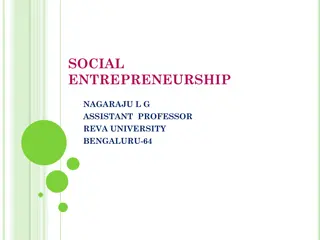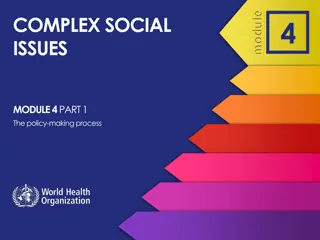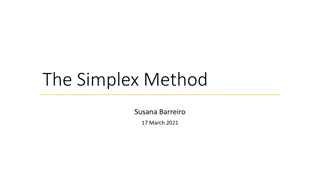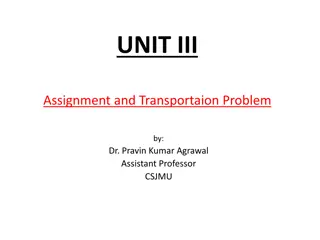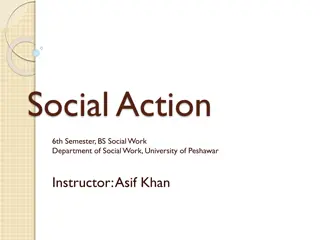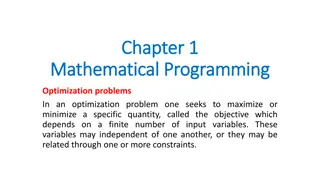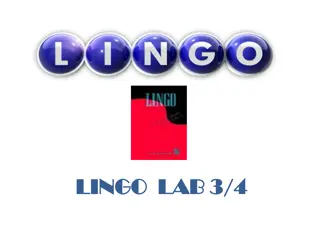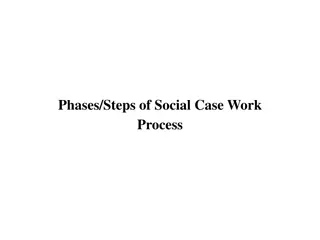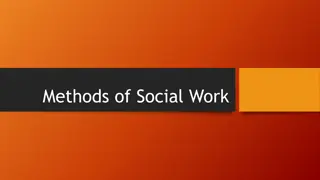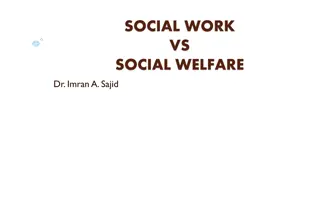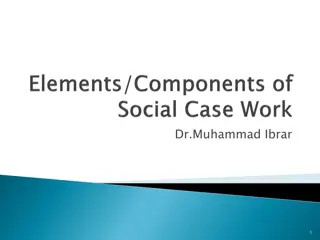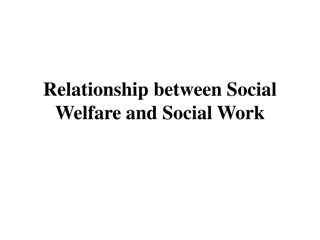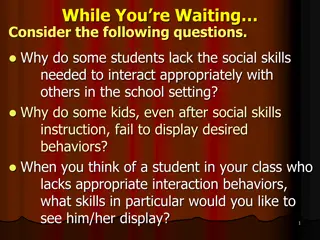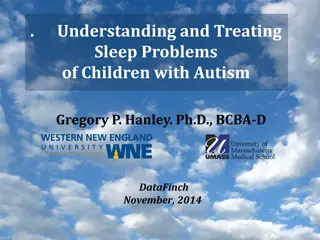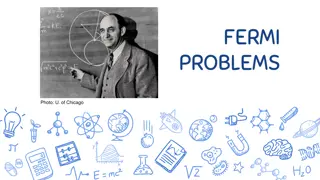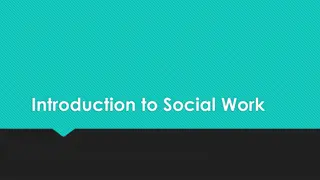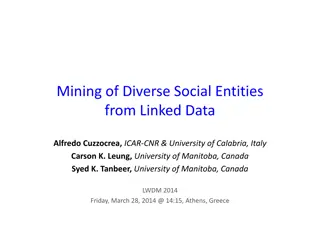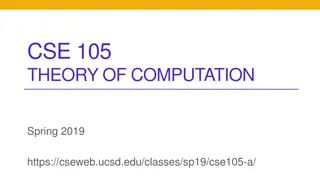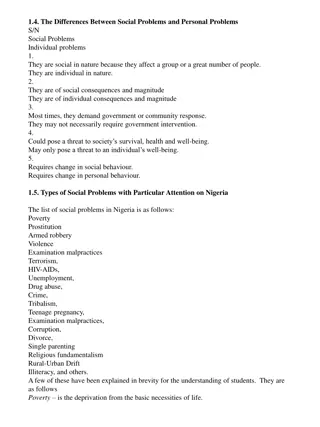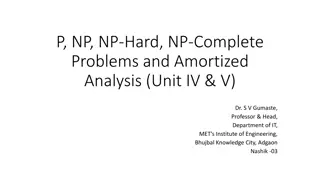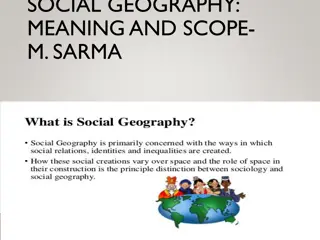Understanding the Formulation of Hypothesis and Research Problem Definition
Research problems arise from situations requiring solutions, faced by individuals, groups, organizations, or society. Researchers define research problems through questions or issues they aim to answer or solve. Various sources such as intuitions, research studies, brainstorming sessions, and consul
3 views • 25 slides
Understanding Social Entrepreneurship, Social Enterprise, and Social Innovation
Social entrepreneurship involves creating sustainable social impact, social enterprises address challenges in critical needs sectors, and social innovation focuses on developing effective solutions to social and environmental issues. These concepts emphasize creating social value while engaging with
2 views • 19 slides
Understanding Policy Making for Complex Social Issues
Recognize the complexity of social issues and the need for strategic, collaborative approaches in policy-making. Learn how to address wicked problems like obesity through Health in All Policies thinking. Explore the challenges of complex, complicated, disorder, and chaotic problems. Gain insights in
1 views • 7 slides
Understanding The Simplex Method for Linear Programming
The simplex method is an algebraic procedure used to solve linear programming problems by maximizing or minimizing an objective function subject to certain constraints. This method is essential for dealing with real-life problems involving multiple variables and finding optimal solutions. The proces
0 views • 56 slides
Linear Programming Models for Product-Mix Problems and LP Problem Solutions
This unit covers the formulation of linear programming (LP) models for product-mix problems, including graphical and simplex methods for solving LP problems along with the concept of duality. It also delves into transportation problems, offering insights into LP problem resolution techniques.
0 views • 137 slides
Learning Objectives in Mathematics Education
The learning objectives in this mathematics course include identifying key words, translating sentences into mathematical equations, and developing problem-solving strategies. Students will solve word problems involving relationships between numbers, geometric problems with perimeter, percentage and
0 views • 30 slides
Understanding the Importance of Social Skills for Mental Health Recovery
Social skills play a crucial role in how we communicate, interact, and form relationships with others. They are essential for personal, social, and professional success. Neglecting social skills can hinder mental health recovery, as they contribute to social recognition, acceptance, and building soc
2 views • 12 slides
Understanding Medical Social Work and Its Impact on Patient Well-being
Medical Social Work, also known as Health Care Social Work, plays a crucial role in addressing the social, physical, and psychological needs of patients. Through providing case work, after-care, and convalescence services, Medical Social Workers contribute to reducing hospital readmissions, preventi
0 views • 12 slides
Understanding the Concept of Social Action in Professional Social Work
Social action is a crucial method in professional social work that involves organized efforts to bring about structural changes in society or prevent adverse changes. It addresses social problems like the dowry system, environmental destruction, and health issues through mobilizing masses for impact
0 views • 22 slides
Introduction to Mathematical Programming and Optimization Problems
In optimization problems, one aims to maximize or minimize an objective based on input variables subject to constraints. This involves mathematical programming where functions and relationships define the objective and constraints. Linear, integer, and quadratic programs represent different types of
0 views • 25 slides
Examples of Optimization Problems Solved Using LINGO Software
This content provides examples of optimization problems solved using LINGO software. It includes problems such as job assignments to machines, finding optimal solutions, and solving knapsack problems. Detailed models, constraints, and solutions are illustrated with images. Optimization techniques an
1 views • 41 slides
Objectives and Importance of Social Legislation for Social Workers
Social legislation is inspired by the constitution and aims to remove discrimination, safeguard rights of vulnerable groups, and eradicate social evils. It plays a crucial role in social welfare by providing a legal basis for addressing societal issues, enhancing community well-being, and facilitati
0 views • 4 slides
Phases and Steps of Social Case Work Process
Social case work process involves three main phases: Social Study, Social Diagnosis, and Social Treatment. The Social Study phase focuses on acquiring facts about the client's situation, while Social Diagnosis involves the professional opinion of the case worker towards a solution. Social Treatment
0 views • 7 slides
Formulation of Linear Programming Problems in Decision Making
Linear Programming is a mathematical technique used to optimize resource allocation and achieve specific objectives in decision-making. The nature of Linear Programming problems includes product-mix and blending problems, with components like decision variables and constraints. Various terminologies
1 views • 14 slides
Understanding Methods of Social Work
Methods of social work encompass various approaches aimed at enhancing social functioning and addressing problems in individuals and communities. These methods are categorized into primary and secondary methods, each serving different purposes in the field. Primary methods involve direct interaction
0 views • 20 slides
Understanding the Difference Between Social Work and Social Welfare
Social work and social welfare are often used interchangeably, but there are distinct differences between the two. Social work involves highly trained professionals providing services to individuals and communities in need, using problem-solving methods. On the other hand, social welfare focuses on
0 views • 9 slides
Understanding Social Case Work: Elements and Process
Social case work, as defined by H.H. Perlman, is a process used by human welfare agencies to assist individuals in coping with problems in social functioning. The fundamental elements include the person/client, problem, agency, process, and professional representative (social worker). The client, wh
0 views • 14 slides
Understanding the Relationship Between Social Welfare and Social Work
Social welfare and social work are interconnected concepts aimed at enhancing societal well-being. Social welfare refers to a nation's system of programs and services meeting essential needs, while social work involves professional activities supporting individuals and communities in achieving socia
0 views • 6 slides
Understanding Social Case Work and Its Components
Social Case Work is a key method in social work that focuses on assisting individuals with psychosocial issues. It involves analyzing individual problems within their setting to help clients improve social relationships and adjustments. Components include the person, problem, place (agency), process
0 views • 11 slides
Social Economy and Innovation in Emilia-Romagna Region
Emilia-Romagna Region in Italy highlights the importance of social economy and innovation for sustainable development. Various initiatives such as Social Cooperatives and Voluntary Associations contribute to the region's social well-being. The focus on social values and not-for-profit activities dri
1 views • 15 slides
Understanding Social Skills Development in Students
Explore the reasons behind students lacking social skills in school settings and analyze the challenges some face even after receiving social skills instruction. Discover the key social skills required for appropriate interactions and the importance of social competence for overall well-being. Delve
0 views • 64 slides
Engaging Mathematics Problems for Critical Thinking and Fun Learning
Explore a collection of engaging mathematics problems and classical brain teasers that challenge students to think critically, problem-solve creatively, and have fun while learning. From dissection tasks to card dealing challenges, these problems encourage students to readjust, reformulate, and exte
0 views • 36 slides
Algorithm Design Techniques: Divide and Conquer
Algorithm design techniques such as divide and conquer, dynamic programming, and greedy algorithms are essential for solving complex problems by breaking them down into smaller sub-problems and combining their solutions. Divide and conquer involves breaking a problem into unrelated sub-problems, sol
1 views • 13 slides
Understanding and Treating Sleep Problems in Children with Autism
Sleep problems in children with autism are viewed as skill deficits that can be addressed through relevant skills teaching. Good sleep is crucial for children's overall well-being, as it affects mood, behavior, learning, and physical health. Lack of good sleep can lead to irritability, fatigue, unin
0 views • 75 slides
Computational Complexity and NP-Complete Problems
In today's discussion, we delved into computational complexity and the challenges faced in finding efficient algorithms for various problems. We explored how some problems defy easy categorization and resist polynomial-time solutions. The concept of NP-complete problems was also introduced, highligh
0 views • 38 slides
Automatically Generating Algebra Problems: A Computer-Assisted Approach
Computer-assisted refinement in problem generation involves creating algebraic problems similar to a given proof problem by beginning with natural generalizations and user-driven fine-tuning. This process is useful for high school teachers to provide varied practice examples, assignments, and examin
0 views • 16 slides
Fermi Problems and Estimation Techniques in Science
Understand Enrico Fermi's approach to problem-solving through estimation in science as demonstrated by Fermi Problems. These problems involve making educated guesses to reach approximate answers, fostering creativity, critical thinking, and estimation skills. Explore the application of Fermi Problem
0 views • 23 slides
Understanding Social Issues through Theory and Perspectives
Social theory is a system of interconnected ideas that organizes knowledge about the social world. It helps us analyze social problems like social pathology, disorganization, conflicts in values, and deviant behaviors. Differentiating theory, perspective, and model, it's key to note that theories pr
0 views • 37 slides
Understanding Signatures, Commitments, and Zero-Knowledge in Lattice Problems
Explore the intricacies of lattice problems such as Learning With Errors (LWE) and Short Integer Solution (SIS), and their relation to the Knapsack Problem. Delve into the hardness of these problems and their applications in building secure cryptographic schemes based on polynomial rings and lattice
0 views • 44 slides
Understanding Social Work: Key Concepts and Principles
Social work is a professional field focused on promoting social change, solving human relationship problems, and empowering individuals for well-being. It integrates theories of human behavior and social systems with a foundation on human rights and social justice. By drawing on a broad knowledge ba
0 views • 14 slides
Understanding Social Neuroscience: Exploring Human Sociality and Well-Being
Social neuroscience delves into how the brain processes social interactions and their impact on human well-being. It focuses on the interconnectedness between social connections and overall life satisfaction, suggesting that humans are inherently social beings with a strong need for social belonging
2 views • 21 slides
Social Entrepreneurship and Social Inclusion in Bulgaria
The development and implementation of social entrepreneurship practices in Bulgaria aim to promote social inclusion through the development of the social economy. The focus is on combining economic results with social objectives, managed transparently with measurable, positive financial value. Vario
2 views • 12 slides
Diverse Social Entities Mining from Linked Data in Social Networks
This research focuses on mining diverse social entities from linked data in social networks using a DF-tree structure and DF-growth mining algorithm. The study explores the extraction of important linked data in social networks and the mining of various social entities such as friends. Prominence va
0 views • 13 slides
Theory of Computation: Decidability and Encoding in CSE 105 Class
Explore the concepts of decidability, encoding, and computational problems in CSE 105 Theory of Computation class. Learn about decision problems, encodings for Turing Machines, framing problems as languages of strings, and examples of computational problems and their encodings. Gain insights into th
0 views • 26 slides
Understanding Social Problems in Nigeria
Social problems in Nigeria encompass issues like poverty, prostitution, armed robbery, violence, terrorism, HIV-AIDs, unemployment, drug abuse, crime, tribalism, and more. These problems stem from various causes such as lack of education, political corruption, unemployment, and social inequalities.
0 views • 4 slides
Insights into NP-Hard Problems in Molecular Biology and Genetics
Understanding the complexity of NP-Hard Problems arising in molecular biology and genetics is crucial. These problems involve genome sequencing, global alignment of multiple genomes, identifying relations through genome comparison, discovering dysregulated pathways in human diseases, and finding spe
0 views • 24 slides
Understanding P, NP, NP-Hard, NP-Complete Problems and Amortized Analysis
This comprehensive study covers P, NP, NP-Hard, NP-Complete Problems, and Amortized Analysis, including examples and concepts like Reduction, Vertex Cover, Max-Clique, 3-SAT, and Hamiltonian Cycle. It delves into Polynomial versus Non-Polynomial problems, outlining the difficulties and unsolvability
0 views • 32 slides
Understanding Social Geography: Meaning, Scope, and Differences
Social geography is a branch of human geography focusing on social structures, groups, and activities. It examines the spatial arrangement of social phenomena, social differences, and patterns in understanding socially defined population groups. The scope of social geography includes analyzing spati
0 views • 25 slides
Understanding Wicked Social Problems in Design and Management
Explore the concept of wicked problems in social and cultural contexts through the lens of design and management. Richard Buchanan, a prominent professor in the field, delves into the complex nature of issues such as poverty, sustainability, and equality, discussing their impact on society. Learn ab
0 views • 8 slides
Evolution of Sociological Perspectives on Social Problems
The study of social problems has evolved dramatically since the 1970s, shifting from an objectivist approach to a more subjective and constructionist perspective. This shift acknowledges that what is considered a social problem is a matter of definition, and focuses on the social processes involved
0 views • 12 slides

